Monday, January 31, 2005
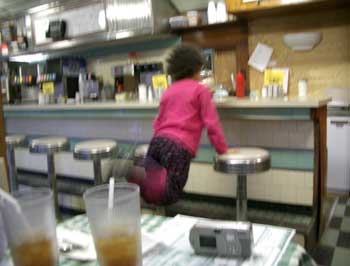
THIS DINER'S JUMPING
Yesterday I met up, for the first time, with fellow bloggers Lorianne and Ivy in Peterborough, New Hampshire. "I assume we'll know each other...?" one of us asked, by e-mail. Yes, probably. I was the last one to arrive at the busy coffee and gift shop where we'd set our rendezvous, and when I rounded the corner, past the fresh flowers, patchouli-scented candles and chocolate moose lollipops (with peanut butter antlers), there was L.'s familiar face, waving her hands as she talked to I. She looked up and grinned, and the three of us didn't stop talking until we parted several hours later, at dusk, in front of the dark green Peterborough diner where we'd gone for a second round of tea and snacks. It was a fun place to show Ivy - a real American diner, with authentic pea-green tiles and swivel stools, and even a jukebox in the back.
As Lorianne wrote, there's often something magical about meeting people you've gotten to know online; it's no mystery to me why it works for people to meet on the internet, fall in love and get married. Despite never having seen either of these wonderful women in person before, or even talking on the phone, and all of us being surprised about some superficial physical things about each other, it all felt so...familiar. And it was so easy to cut to the chase, and enter into easy convivial conversation about poetry, the writing life, the personal challenges, where we'd been and where we hoped to go. With hundreds of posts read and written, there was no shortage of conversation topics, either: the dog, the trip to Australia, the apartment in Montreal, the marriages, the poetry manuscripts, the residency, the Zen retreats, the dissertation, the book half written...not to mention the other online personalities and relationships that spun back and forth between the three of us like shiny threads. What does surprise me is finding out that I like the people even more than I thought I would, and that none of us have revealed so much that there is nothing of interest left to discover. I would have happily kept talking, if I hadn't had a long drive back home in the dark ahead of me. And I'll happily pick up the conversation again, when the chance arises.
5:33 PM
|
Saturday, January 29, 2005

RE-ARRANGING
Today we re-arranged the furniture. In our house we have two connected rooms that we use for living and dining space. For the past few years, we've had the table on the south wall, where there's the most light - but that has meant that there are two seating areas, one in each of the two rooms. It hasn't worked that well, and after moving some of our favorite things to Montreal, the whole living area has seemed depressing to me. So today I cleaned up all the leftover Christmas things, cleared off all the surfaces, and started dragging furniture around. J. came up and offered to help me; three or four dusty hours later the only item still in its same location was the piano. We decided to get rid of the coffee table and one other table, and to make one sitting area in the southern room, and make the other room into just dining. We also straightened up the bookshelves - no more books piled on other books, or papers stuck inbetween books - but stopped short of the actual purge we're planning to do. We moved the couch away from, and perpendicular to, the wall of books, so you can actually see all of them and easily get volumes off hte lower shelves. Now, sitting here after having our neighbors over for dinner, I'm very happy: it all worked so much better than before and I don't feel crowded by stuff. The Montreal move has made us both very clear on this: we want less, and only the things that really matter. Every step in that direction has felt liberating.
--
Our neighbors are Icelandic, and during the conversation, which is always fun and far-ranging, there are usually some good-natured jabs from us about their "wenting" and "wegetables", and often some expression form them that we've never heard. Tonight, as they discussed their different styles of dealing with their little daughter, the wife suddenly acknowledged to her husband, "Yes, there's a fly foot."
"What?" we asked. "Did you say, 'there a fly afoot?'"
"No," they laughed. "A 'fly foot' means a little point - like 'a grain of truth'". How perfect!
--
Tomorrow I'm planning, with great excitement, to get together with two real live blogger-friends; none of us have met before. Report to come!
11:39 PM
|
Friday, January 28, 2005
SOME MORE LINKS
Two of my favorite bloggers have returned to their pages after times of mourning, for different reasons; I'm so happy to hear their voices again. Ana at Funny Accent writes in her engaging and fascinating way about how to make Malaysian fish curry, telling us much more than the recipe; and at Footprints, there is a new Pippi Longstocking story, (yes! remember her?) and some new hope after soul-searching for a response to the world's tragedy and loss.
8:47 PM
|
Good news! A new post from Idle Words, the blog of Maciej Ceglowski. I like Maciej's writing so much that I scan my RSS feeds eagerly each day, hoping he will have posted something, but these gems are like wild mushrooms - delicious, but rare and unpredictable. Maciej has recently moved to The Big Apple, after a long sojourn in Vermont and a too-brief summer in Montreal; if you ever have time on your hands, read his archives.
8:59 AM
|
Yesterday's linked interview with Seymour Hersh made some startling comments about race. Here, Paul Krugman of the New York Times takes on the President's argument that the present Social Security system is disproportionately bad for blacks, pointing out that the administration's argument is not only flawed, but immoral.
...so the claim that Social Security is unfair to blacks is just false. And the fact that privatizers keep making that claim, after their calculations have repeatedly been shown to be wrong, is yet another indicator of the fundamental dishonesty of their sales pitch.
What's really shameful about Mr. Bush's exploitation of the black death rate, however, is what it takes for granted.
The persistent gap in life expectancy between African-Americans and whites is one measure of the deep inequalities that remain in our society - including highly unequal access to good-quality health care. We ought to be trying to diminish that gap, especially given the fact that black infants are two and half times as likely as white babies to die in their first year...
8:42 AM
|
Thursday, January 27, 2005

Pollarded Tree, Iberville, Quebec
I write here about politics reluctantly, even though it's one of my obsessions. So I will just mention my dismay at yesterday's vote on Condaleeza Rice's nomination, where only thirteen senators had the courage to vote against confirmation. I had called Senator Leahy's office earlier in the day to regster my opinion; I was sure he'd vote against her. He didn't, but Vermont's other senator, Jim Jeffords, did. I was also appalled to hear Joseph Biden, on NPR, defending his vote saying the "the single most important thing is for us to prevail in Iraq." And I was disgusted by Republicans insinuating that Democrats who voted against Rice failed to recognize the historic significance of confirming the first black woman secretary of state - as if a vote against blatant lying, or against a person who all of Europe detests and mistrusts, was suddenly racism.
3:22 PM
|
We've Been Taken Over by a Cult: Seymour Hersh talks to Amy Goodman
This is a very rough transcript of a recent interview. Some people are skeptical about Hersh, who has been writing what he calls an "alternative history" of the Iraq war in the New Yorker. But what he says here about the present American government and, more especially, about the largely hidden, and hideous, cost of the war to individual soldiers and families, and ultimately to all of us, is something everyone should read.
9:42 AM
|
Tuesday, January 25, 2005
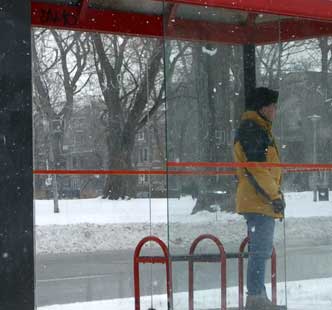
Bus Stop, rue Rachel, Montreal
BUT HERE IN VERMONT, IT'S A WORKING AFTERNOON
2:30 Procrastinating from the paying work at hand. Lulled by the sunlight coming in the windows onto the busy little rosemary leaves; the translucent plump jade-plant leaves; the dusty floorboards; the pleated windowshade, slightly askew. This torpor gives way to a wave of sleepiness. I feel the sunlight on one foot, straight through the black leather of my clogs, and at the same time, shake my shoulders to lessen the winter chill. Here are an apple and two forelle pears on the table in front of me, all exactly the same shades of yellow and blushing red. I shake my shoulders again; it’s a voluntary motion, a decision that pushes away an involuntary shiver.
3:31 I’m getting something done – one chapter of the book I’m working on is roughly laid out. Right now the sun is glaring in my eyes, blinding me, but I can barely feel it, so long and feeble are its rays. Through the corners of my eyes I glance out through my own hair, backlit and golden. I pass my hands through the air, feeling for the ray –– it’s like swimming in a lake where there are springs. Ah, there it is, just barely warm. I cup my hands around it, this ball of invisible fire.
4:02 The sun went down behind the hill about five minutes ago, and in five more, I’m going to have to turn the lights on. I’m also going to have to have some tea, or fall asleep. My thoughts move toward the kitchen, and it occurs to me I have no idea what we might have for dinner.
5:34 An hour of tea-powered blog-reading and e-mail writing later, I’m going back to work.
6:45 Four chapters roughly laid out, and I’m not the only one who’s getting hungry around here; J. has already opened the refrigerator once, searching hopefully. The upstairs heat has come back on; evening thermostat cycle. Sigh. Breathe. Relax. Don’t look over at the piano and the untouched volumes of Brahms, Mendelssohn, the Christmas decorations still out, the unanswered cards. Make some dinner.
8:06 Final push. If I can get all five chapters done tonight, that would be great. My mouth is still tingling from dinner – an impromptu Thai red curry of shrimp and vegetables on rice, with yogurt instead of coconut milk.
8:54 Finished. J. will add the graphics while I am out tomorrow, then I have about five hours of table design to do, then another five of fine-tuning, adding tables of contents, map and figure lists, making sure the bookmarks work in the .pdf... but now, maybe there’s time for some piano after all, or some reading. Or some sleep.
8:57 PM
|
Monday, January 24, 2005
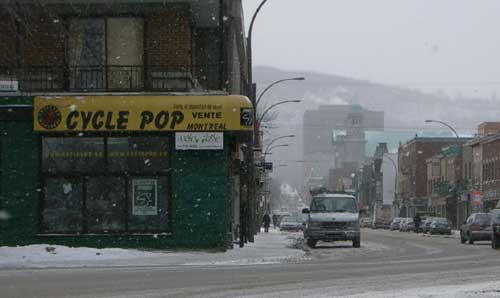
CYCLE POP (coin de Rachel et Christophe-Colombe)
Back home in Vermont now, but this was from today, as we left town.
We came home to quite a bit of accumulated snow - enough that we couldn't park the car and had to snow-blow and shovel first in order to get into the driveway. But it was beautiful, feather-weight snow, and I worked happily in early darkness, the crisp cold biting my cheeks and hands, with stars just beginning to come out in a cloud-smeared sky.
9:04 PM
|
This will be a travel day, and unless things change dramatically, we should be able to avoid the snow and drive fairly easily, taking my brother-in-law and sister-in-law to Trudeau airport first, coming back and picking up our things and leaving in early afternoon. I'm always a bit melancholy, leaving here, and in spite of the sunshine that was streaming into the apartment this morning - so strong and low that it reached all the way to the back wall - I found myself staring wistfully out the front window as I made the coffee.
Yesterday afternoon the four of us went to a matinee of a new movie about Haiti - "Taste for Young Women" - which is a male coming-of-age story set against the backdrop of Duvalier's death, with poetry by Haitian poet Saint-Aude. It's very good, and immediately transporting: at 4:00 we emerged, blinking and dazed, into the impossibly cold, bright afternoon.
8:51 AM
|
Saturday, January 22, 2005
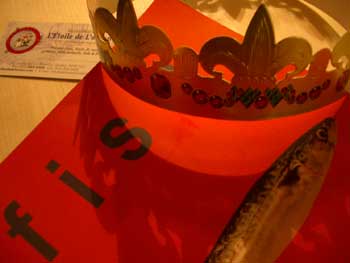
Wrapped in layers of scarves, wool, fleece, down, and polypropelene long underwear, the four of us we walked to the Portugese section of the Plateau (west of Eglise Jean-Baptiste on rue Rachel) for a late dinner last night. Passing several bakeries and groceries filled with piles of snow-white meringues, crusty round loaves and flat-bottomed sweet portugese rolls, hams, and fragrant barbequed chicken turned on a grill by a white-aproned chef, we tumbled, blinking and dazed, from the frigid night into the warm, yellow-toned interior of the restaurant, with its harbor landscape in handpainted blue tiles behind the bar, and the concerned friendly faces of the waitstaff and host who helped us peel off coats and find a table. (L'Etoile de l'Ocean, 101 rue Rachel)
We ordered a liter of red wine and were given a basket of bread and a plate of shiny black olives. D. ordered soup, a thick bowl of pureed potatoes with other vegetables and sharp greens - delicious - and J. and I. ordered a plate of grilled calamari, which arrived arranged like the points of a star, tentacles in the middle, lightly grilled and swimming in a sauce of garlic-infused oil. For dinner G. ate pork cutlets with perfectly fried potatoes; D. a stew of pork and clams that he said was a very typical dish. J. and I both had the poisson du jour - salmon for him, and dorade royale for me. I had never eaten dorade before, and it came whole, with its head and fins and all its bones. Other than its boniness, it was one of the best fish I've ever eaten - firm, delicious, in a very light butter/oil sauce. Meanwhile, a singer, in black beret, played guitar and sang fado, walking between the tables.
The dorade, I learned later, is a type of sea bream, and highly-prized for its flavor, but becoming rare in its main source, the Mediterranean. The Israelis have a booming industry of fish farming that includes careful dorade culture, and they are now the source of most of the dorade that make their way into the restaurants of North America. My British, tongue-in-cheek, and excellently chatty fish book also told me:
What's really 90's about these fish, or perhaps 80's come to think of it, is their bisexuality. Like many of the Sparidae family, they start off being male and transform themselves into females at a certain age, with testes developing first and ovaries next. what a life! And a crown and good looks to boot.
The crown theme continued when we arrived back at our apartment - from Le Petit Fourneau, also down the street, D. and G. had brought a galette du roi, a special French cake made only during the season of Epiphany, for our dessert. This was also new to me - a round, not terribly sweet cake with a crusty brown top and an almond-flovored interior into which a small prize is baked - the recipient gets to wear the gold crown that encircles the cake in its box.
I figure I can afford the calories. While we drank strong black coffee and ate our cake, D. read to us from an article on "The Food of the North" by Jane Stevenson and Peter Davidson (from the journal Petits Propos Culinaires, No. 77):
Another invisible line crosses the maps, passing through Britain in the northern part of Europe, defining North by the regions where the climate will not support a diet based on vegetables and grain. This gave vegetables and fruit the status of a luxury in the north of Europe in the past, encouraged the building fo walled gardens, cold-frames, hot-beds. Denmark and the Netherlands are exceptions, ingenious in vegetable gardening and focused on milk as a source of protein. There are tracts of northern Europe where the only way of garnering regular food from the land is by eating the meat of grazing animals: cattle, sheep, then reindeer.
This grain to meat trends intensifies until, in the Arctic, it results in a people, the Inuit, who are physiologically adapted to living on an entirely animal diet. Animal fat, until the twentieth century arrival of imported food and power, was the essential fuel of the Arctic: fire, light, and human energy all came from fat. Fat is essential, virtually sacred, in a climate where it takes 6,000-7,000 calories a day to work while retaining bodily warmth...
We've got a good start on that.
10:43 AM
|
Friday, January 21, 2005
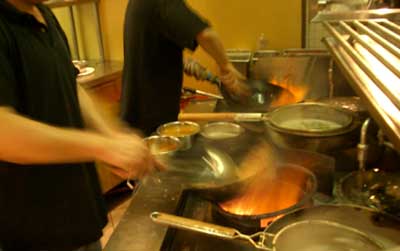
FIRE, NOT ICE
This was Thai fast food, being cooked in front of me a few days ago. Today it is -20 degrees C., so the idea of warmth in any form is welcome. My brother-in-law and his wife arrived yesterday from D.C., escaping the inauguration; they aren't used to the weather but are out today, exploring the markets - we plan to meet up for a Portugese dinner later tonight, since they know what to look for in that cuisine and we don't. Meanwhile, I'm layered-up, and working...
The discussion in the comment thread on the previous post is a lot more interesting than anything else I could write today, so I'll call your attention to that and invite everyone's input. Thank you to everyone who has commented so far for making this another great discussion.
1:14 PM
|
Wednesday, January 19, 2005
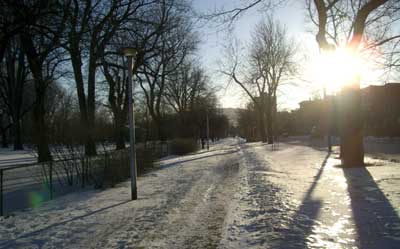
YESTERDAY. BRRRR.
In the comments on the previous post, Loren wrote:
It was tempting to just ignore the institution and to pay attention to individual students, the ones that most needed your help, but in the end unless you changed the institution itself you could never solve the problems those kids, and thousands like them, faced.
That's it, in a nutshell. And as someone who has always taken that path - of trying to work for change within the institutions themselves - I agree with him. What's changed for me is that in two particular places I feel that I've come up against a wall, and that institutional change is not the possibility I once believed in - although I continue to have hope that eventually, change will happen. One is within the Anglican Church, where one side is utterly unwilling to talk to the other, and insists on "our way or no way", and where the debate has all but obscured the work that we ought to be doing together (and look at what I've been doing - writing a book about the politics of that, hoping that my words can somehow persuade or influence change). The other place is American politics, where one side now controls everything, wielding almost unchecked power.
I disagree with much of the American left, who seem to feel that if they only can regroup, "reach out" and spin their message differently, the balance will shift to them. This is, I feel, both naive and limited, and except for a few outstanding individuals, it will have neither authenticity nor sufficient authority to really change policy or opinion at a root level - either in Washington or in the heartland. The true change required is enormous, and will take generations: it has to take place in the American psyche - including the hearts of many who "vote Democratic" but live lives that are exploitative and consumptive and do not embrace truly understand the diversity and interdependence of our world. Even more difficult, that change of heart has to include conquering the power of fear.
I'm questioning whether it is worth it to continue beating my head against these particular institutional walls. What I have to do, I think, is to take a much longer perspective. Making changes in my own lifestyle, speaking and writing and living about a different way of being in the world -- these are real actions I can take without arguing with anyone, but I think they have just as much potential power. Top-down change only works when you have a critical mass of people who are extremely courageous, and willing to put their careers on the line without compromise. The Episcopal Church in the US, for example, has been very fortunate that the presiding bishop, Frank Grisworld, came into his own during the debate overhomosexuality and refused to back down when the pressure to do so was increased. Here in Montreal, Christ Church Cathedral has taken a collective, progressive, and courageous stand in support of gays and lesbians - within a wider Anglican context that is much more mixed and even hostile. The rainbow flag at the door keeps being taken down, and to keeps being put back up - in fact there were jokes last week about painting it on the building. There are many contexts, both within the church and outside it, for me to be in solidarity with gays and lesbians and to work for change. On the other hand, when it comes to discussing politics and morality, the American church is just as divided as the populace: it is nearly impossible for an Episcopal Church, or other progressive mainline parishes, to take a strong stand against war and killing, while the conservative churches are united in their support of war and the current president. I find that untendable and deeply disturbing.
I don't see courageous leadership emerging in American politics; furthermore the extent of the division is so extreme, and corporate interests and money so linked with governmental power, that we are unlikely to see significant change happen for a very long time. This means that those of us who hope for a different paradigm have to find other ways to make our lives count and to live into our beliefs. Within many interest areas - for example, the environment, human rights, spirituality, encouraging creativity through the arts, education - there are ways to make a difference and to begin the process of changing hearts and overcoming people's fear of change, modernity, and "otherness". But we have to take a long view and realize we may not even live long enough to see the effect of our efforts; we have to find ways to keep working forward positively but perhaps almost in underground ways -- not losing hope so that we can continue to give hope.
10:55 AM
|
Sunday, January 16, 2005
Two and a half hours of my day today were spent in discussion of the Eames Report with other members of the congregation of Christ Church Cathedral, Montreal. The bishop of Montreal had been invited, and he came to listen, saying very little. The conversation - the third of three sessions - was remarkable. No fighting, in spite of some disagreement; the discussion was intelligent, informed, searching, often profound; people spoke about their personal lives and feelings in a way that was caring, honest, respectful, and quite trusting of one another. I felt impressed and honored to be a part of it.
My own feeling, that I expressed toward the end, was that if the African bishops and conservative bishops in the US want to leave, nothing we do short of caving in to their demands and "repenting" of our "errors" will stop it. And if the Anglican Communion comes apart as a result, then it will come apart. I don't seek that or want it, but I can't stop it and be true to what I feel is right. But whatever happens to the Anglican Communion doesn't change one iota my own responsibility, and our responsibility together as a particular group of committed people, to listen to what we are being called to do: to love each other as ourselves, to alleviate suffering, to heal division, to bring hope to a broken world, to change our own lives so that the poor can live. This means, for example, that regardless of the views and action of African bishops I cannot stop being called into relationship with the people in Africa who suffer because of AIDS, or into relationship with my Muslim brothers and sisters regardless of what my government's policies are, or into relationship with the gay and lesbian members of my community. And in each of these cases, that means allowing the "other" to minister to me as well so that I can learn from them - as the bishop pointed out in one of his few comments on the discussion.
We spend so much energy dealing with institutions and their internal politics rather than doing the work that love calls us to do. When you're in a room full of people who want to do the latter, that's so very obvious. Choosing to use our energy otherwise is also a temptation, a seduction: it is often easier and more compelling to argue about politics, for example, than to act compassionately and simply from one's beliefs, or to try to enter into genuine relationship with others. This is not to say that systems don't need reform, and demand our attention. But at the beginning, and at the end, the needs of our world continue to exist, and our basic calling and responsibility to one another are the same. Part of what I realize I am seeking in my own life is a greater ability to get on with that work and leave the arguing behind.
9:12 PM
|
Saturday, January 15, 2005
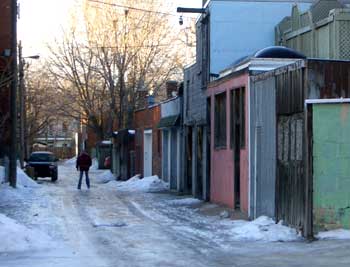
ICE WORLD
This is an alley near our apartment. The sidewalks are mostly clear now, after warm weather and rain, but the alleys and the sidewalks that get flooded - like those in the park - are glare ice. Montreal streets are arranged with long, narrow, attached, multi-unit (usually brick) buildings running perpendicular to the streets. These back up on an alley that is parallel to the two streets. A lot goes on in the alleys: people have gardens in their backyards, and clotheslines, and sheds for tools and sometimes for parking; many of us use the alleys for walking and biking although, as you can see, that is a little difficult right now. I like them because I can often get a greater sense of people's lives from the back than from the street, and the alleys are quiet, with little traffic. And of course, there are always cats.
After sleeping late this morning (I could use three or four mornings like that right now) I made a simple potato soup - a creamy puree of potatoes and zucchini with diced carrots, onions, and celery based on a recipe in Marcella Hazan's Essentials of Italian Cooking - which we ate with the leftover baguette and some laham bi ajeen (a Lebanese pizza-relative, with a very thin crust and a thin layer of ground lamb, chopped tomatoes, onions, and spices) from Adonis, the Middle Eastern supermarket we visit about once a week. Then I buckled down and got some work done. In the late afternoon I went for a long walk in the bracing cold to "clear out the cobwebs", as my grandmother always said, ending up in Cafe Bicycletta drinking a cappuchino and reading La Presse. This newspaper, for the francophone community, appeals to me both for language practice, since it is written at a pretty high level - no nod whatsoever to the anglophones - that is a challenge to me, and because it is beautifully designed. In fact I searched the net for the headline typeface it uses, because I like it so much and had never seen it before - unless I'm mistaken, it is Relay, designed by Cyrus Highsmith and available from FontBureau. (Unfortunately, you can't see the way the pages look on the La Presse website).
Le film "Les Invasions barbares": est-il exact?
Last night we finally watched The Barbarian Invasions, a Quebec-made film and Oscar-nominee that was on my must-see list this year. Director Denys Arcand takes on a slew of controversial topics, from the Canadian health care system to euthanasia, in a beautifully-acted, ambitious, heartfelt film. I'd be very interested to hear from Canadian readers how accurate they feel his portrait - which sometimes felt like a caricature, to make various points - actually is. It's especially interesting in the light of the present debate about building a new 700-bed super-hospital in Montreal - possibly on the site of the Olympic Stadium.
5:09 PM
|
Friday, January 14, 2005
After a day of phone conversations and e-mailing related to work, we took off in late afternoon for a walk in the neighborhood. It was cold, but not bitter, in spite of that familiar stiff wind, and we walked on Mont Royal as far as Premiere Moisson, stopping in to get a baguette. The fellow in front of us was buying about thirty, which had been packed on end into two large brown paper bags. They had all just come out of the oven, and they felt like feathers. J. put ours underneath his coat, and we headed back to our house, past a woman standing on her doorstep with hockey skates and a pair of cross-country skiis; a mother nonchalantly waiting outsdie a shop for her two kids who were rolling around on the sidewalk, laughing; past the totally frozen schoolyard where four boys played with a football, sliding and falling over each other every time they moved. As we walked up to our door, J. said, "it's still warm," and he handed me the baguette; he was right. I made a pot of tea, and we tore the baguette into pieces and ate nearly the entire thing with butter and jam.
8:45 PM
|
Thursday, January 13, 2005
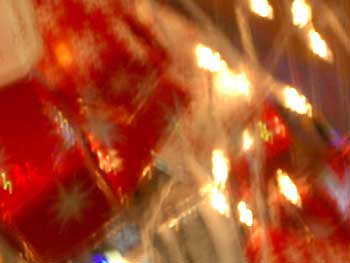
On the way up to Montreal today, listening to old Bob Dylan, Joni Mitchell, and Neil Young CDs, we stopped at a new favorite Chinese take-out place in Burlington, Vermont, for a late lunch. It's a homespun sort of place, run by an affable young Chinese man with tattooed arms and a shaved head; he and his helper/girlfriend? were doing all the cooking today, and we stood by the counter and watched the steaming, sizzling woks as they prepared our meals to order. I was happy that they still had their Christmas decorations up: three sizes of take-out boxes folded from red and white holiday papers, hung thickly among icicle lights over the counter and along the windows. "We spent so much time making them," the proprietor told me, "we thought we'd leave them up a little while longer." I'd loved them when we stopped the last time, in a heavy snowstorm, and again today, when rain had melted all but a few piles of snow and the air was so balmy you didn't need a coat.
Montreal was beautiful and sparkling with light as we drove over the Pont Jacques Cartier after dark. "It's funny," J. remarked, "In the country you feel like you own a piece of it, somehow. You never feel like you own a city - but you feel like you're part of it."
We had stopped and bought vegetables and fruits at a fruiterie on Blvd. Taschereau (known to us now, thanks to Ed, as "the deplorable Blvd Taschereau", or "Trashy Boulevard") on the way in - it's merely a long strip mall, no worse than many on the outskirts of just about every American city, but not attractive to many city-center dwellers. There is also a boucherie, and there I bought two paupiettes de veau - little wrapped packages of veal stuffed with bread and herbs, surrounded with some fat, all tied carefully into small round individual morsels, about three and a half inches across. "Comment cuit-on les paupiettes?" I asked the butcher, a young fellow I've talked to before. "Ah!" he said, and proceeded to give me simple instructions in French, which amounted to "take an onion, slice it, put it in the bottom of the pan with some butter, put the veal packages on top, add dry white wine, cook until just done, then reduce the sauce and add a bit of cream." He rolled his eyes and grinned at me. "Tres, tres delicieuse," he said, as I paid him for the meat. We walked away, and J. said, "He's very nice."
"He's very cute," I said.
"I should have known," said J., in mock indignation. But he's the one who got to eat the veal, with the tiniest imaginable asparagus spears, some tagliatelle and the wine-cream-sauce, to which I'd added some sauteed mushrooms, and a perfect, heavy pomegranate for dessert.
It's good to be back.
10:33 PM
|
Wednesday, January 12, 2005
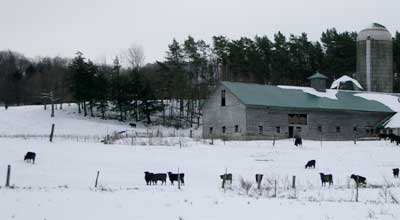
CURIOUS (Black Angus in a central New York pasture)
I drove home yesterday, ahead of the freezing rain that was forecast for New York and western New England, and is now splatting against the windows here, further north in Vermont. It was very good to spend time with my parents, even briefly. I told my father-in-law today that said it was good for all of us to "see each other's faces," and he replied, "and it matters to parents that you made the effort to come all that way." His elder son had been here last weekend too. My father-in-law has been sick, and was briefly in the hospital; today he looked weak and fragile but he came down to the dining room to have lunch with us - his first "outing" in a week or so. There was chicken noodle soup, and custard, which he ate happily, and afterwards we went back to his room with him and repotted the orchid that had stopped blooming, and talked.

While I was with my parents, we had gone into town and I managed to find a remaindered pair of figure skates in my size - very good ones, too good for me - in a shop window for $10. We took them home, and my mother and I put in the long laces. I went down to the garage, pulled out a snow shovel, and headed down to the lake. After testing the ice with one foot, then two, I walked out a few feet and shoveled a long rectangle. There were several inches of very wet snow on the ice, and as I moved it aside an inch of water accumulated on the surface. But I was satisfied that the ice was good enough to test my balance - about thirty years after I had last been on skates.
I went back and got the skates (there was no way I was going to walk down the bank with them on). Mom, ever the good sport and always glad to be outside, accompanied me, handing me a dark red scarf I also hadn't seen since I knitted it for my father, many years before. "Your father says you need a scarf," she said. Dad had already apologized for not doing the shoveling for me; he tore his Achilles tendon when he landed wrong coming down a ladder from the roof, taking down Christmas decorations. (They are pretty amazing for 80-year-olds, especially considering that my mother has been ill.)
The skates were so stiff that my ankles felt blistered before I even got onto the ice, but they also weren't flopping around. I took a few tentative steps, then a glide, wobbled, turned around carefully. Another traverse the length of my short rectangle. Awkward. I started to turn, bobbled, leaned backwards, and in a split second was sitting in the frigid water on top of the ice. Mom and I both laughed, and she held out a hand to help me get up. She shoveled more snow. I went back at it, doing better although my ankles were starting to feel raw - these skates were much too stiff - but I could feel the balance and the hint of rhythm returning. "It's beginning to feel a bit more familiar," I said, grabbing my mother's shoulder as I teetered, coming faster to the end of the small space.
"Oh, you'll get it back," she said. "It's like riding a bicycle." She leaned on the shovel and said, "Look." For the first time that day, the setting sun had suddenly broken through a cloud, sending long yellow rays across the slate-blue snow covering the lake. The snow became whiter, the evergreens greener, the sky deeper blue. We stood and watched the light change, and felt time shift backwards and forwards, from the many days we had spent in that familiar, well-loved spot, skating and laughing and falling, to the reality and wonder of being there again now.
I took a few more glides, satisfied that with comfortable skates and some more practice, I could at least have some fun on the ice again without killing myself. "OK," I said. "Enough for today." I changed into my boots and we headed up the hill to the house. Dad opened the door for me. "I'm a little wet," I said. "I fell on my tail."
"Yep," he said, grinning. "I saw you."

In case anyone wonders why I blog...
In answer to the question "Is it possible to tell people that with your quietness, with your eyes, with your careful attention?" posed in my post of Wednesday, January 5th, Dale (of Mole) wrote this Recollection. In addition to the great discussion that has been happening in the comment threads on that post and the one of Friday, January 7, here is a stunning answer, concrete and poignant. I bow to him and to all my readers.
4:10 PM
|
Monday, January 10, 2005
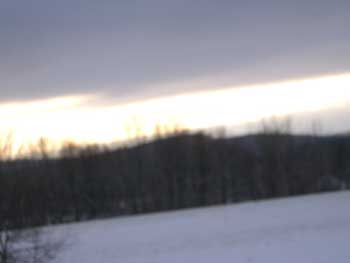
DRIVING
Yesterday I made a spur-of-the-moment decision to make a quick trip to see my parents. It was a clear, beautiful winter day and I drove into the setting sun across Vermont and New York, watching the sky change from blue to rose, and the snow from white to blue. I stopped in Saratoga for a cup of milky tea at 4:30, and then drove in the gathering darkness past the small houses on the edge of the Adirondacks, some still bright with Christmas lights, down into Johnstown and Fonda and onto the New York Thruway for the straight, fast trip across the state to Utica, where I made the left turn and dropped south into the farmland of central New York.
J. and I rarely travel separately; we're rarely apart anyway. When we talked this morning he said he hadn't slept well; I was tired enough to sleep soundly from 12:30 to 5:30, and then began to feel the unfamiliar bed and the coldness of the sheets next to me.
My parents have just run down to town in their little pick-up truck to get some meat for supper, some tea, some bread. I'm alone in their house - my old house - another rare occurance in the years since I've left. It's very nearly silent. The furnace comes on and off, my father's clocks tick and chime, the wind stirs the cedar and hemlock branches outside the window and above the trees, geese wheel on their way back to a new settling spot on the river. The sky and the snow-covered land are simply different values of the same color, broken by the brownish-grey tree trunks of the small woods across the road and the dark green of the conifers.
Everything is the same as it ever was - although of course it isn't. And I feel like the moving point, the colored dot traversing a landscape crossed with a thousand transparent lines I traced as a child, an adolescent, a young woman: running across the field that is now lawn, flip-flopping in plastic sandals down to the water edge to swim, ascending trees that are no longer there.
11:34 AM
|
Friday, January 07, 2005
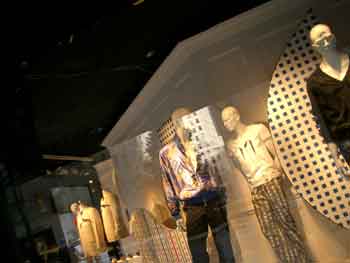
Saks Fifth Avenue, February 2004
In the wide-ranging, terrific comment thread, two posts ago -- I am continually so appreciative of the readers and commenters here -- Siona brought up a question:
"There's an odd paradox in the fact that while Canadians are more comfortable with themselves than are Americans, but they are less secure in their country . . . Canadian culture is seen as being constantly threatened... Does the apparent security of America as a nation mean that Americans have the 'luxury' of feeling insecure themselves?"
What an interesting question! I think Americans are perhaps "secure" about their culture, if secure means basically "content with", and that most Americans feel they're the ones on top who everyone else wants to emulate. This impression comes both from lack of a deeper, genuine exposure to other cultures, and the obvious fact that American movies, jeans, cars, technology...fill in the blank... are considered desirable in many places across the globe, even in many cultures who don't like us much politically. So does that sense of -- let's call it cultural superiority -- give us the luxury of feeling insecure about ourselves?
What do you think? I guess I'd say yes and no. Many people do have a much more nuanced view of American culture and our place in the world, and surely that would be more likely to create anxiety, not security. But I think there is a huge amount of underlying anxiety in our culture anyway, which may be expressed differently, depending on a given person's point of view - one may be worried about terrorism, another about the stock market, another about getting cancer, another about not having the right clothes or the right perfume, another about not being successful - and these worries are all fanned by the mass media and by advertising pressure, as well as family and marital expectations and a lot of other historical/psychological/emotional/practical reasons.
But I'd go so far as to say that I feel that this pervasive anxiety is the defining feature of American society at this point in time. From what foreign friends have told me, when they've come here in recent years, they are very shocked by the extent of this - going so far as to call it paranoia - and how deeply Americans on all levels of society have bought into it. I can tell you that people in other western countries may be anxious too, but it's about George Bush, not about anthrax or shortages of flu vaccine, and the latter sort of anxiety doesn't permeate people's thinking or interfere with their ability to enjoy and appreciate their daily lives.
Of course, in many parts of the world, and in those forgotten and neglected parts of our own country, people can barely live, or their entire lives are circumscribed by genuine fear based on real day-to-day circumstances. So I think Siona points to something essential when she uses the word "luxury". Many of us do have the luxury to be worried and insecure about seemingly trivial things, too, and to focus our attention on them. Some of this is due, I think, to a sense of helplessness and inability to think or engage effectively about the big things - war, terrorism, the economy, the environment - so that people transfer that anxiety to a more personal sphere. And we also have a cultural addiction to wanting things, as a distraction; and buying things, as a quick fix way to feel better; and flaunting them, to assure ourselves that we're actually OK. And this pattern of behavior is, most definitely, a luxury few people in the world enjoy.
Another aspect of this question has to do with cultures based on individuality and self-determination, as opposed to collective cultures where the individual's wants and needs are often secondary to the needs of the group. Here it is culturally normal and acceptable to focus on the self and ask "what do I want or need today in order to feel good?" while in other places, there are people who would never ask that question. Even in small American villages, I've experienced less of the posturing and insecure focus on self-identity I described than in more urban settings - but it still exists.
Anyway - what do you think?
7:32 PM
|
Wednesday, January 05, 2005
SOUND BYTE-ING the A. of C.
A thoughtful article about the theological questions raised by the Asian tsunami by Archbishop of Canterbury Rowan Williams appeared in the Sunday Telegraph last week. In it, Williams attempted to speak about how a thoughtful person might consider the inevitable (and perennial) questions about the existence of God amid terrible suffering. As in most of Williams' writings, he had something to say and said it quite well, freely acknowledging the doubts any intelligent person might have, yet speaking movingly about how action to relieve the suffering is really more meaningful, and may ultimately give us more answers, than theological debate. The Telegraph's headline writers, however, ran the article under the title: "Of course this makes us doubt God's existence."
Lambeth's response, as well as some comments by and about the Telegraph, can be found at Thinking Anglicans.org.
9:37 PM
|
Back in my blogging spot in Vermont, here in the living room where the Christmas decorations are still up and the house is gradually warming. We drove down yesterday afternoon in grey weather, the snow cover dwindling with each mile, and arrived to find our valley swathed in thick fog, the lawn partially unthawed and muddy. We unpacked the perishable things quickly and took off to go to a birthday party for an old friend.
It was a good party, with lots of good food and people we hadn't seen for a long time. But I had the same feeling I often have in such gatherings in the U.S.: a lot of these people are posturing. I think the feeling was heightened because of the New Year's party we had attended in Canada, where we knew very few people except the host and hostess, and there was no feeling like that whatsoever.
Now, I think I've lived long enough to be able to go beneath the surface of most emotions and see at least some of what's there and where the origins might lie. And I know that I used to be more confused and insecure about these social reactions than I am now; for the most part, I'm a pretty confident person and I don't think I need to convince people anymore that I'm anything in particular. So I don't think that these waving antennas signalling "something feels uncomfortable here" appear because of something from inside me, from my own insecurity. I think the feeling originates from the fact that there is a tremendous insecurity about one's own worth in American culture in general which is not present to the same extent in the culture to our north, where people seem much more comfortable both with themselves, and with others.
I've felt it all my life, this jockeying for position and impact, this rather desperate and unhappy feeling of people needing and trying to impress each other: "ohmigod, if only I'd worn higher heels or a more arty jacket or could say I had a show coming up, or if I had something, some new techno gadget, maybe..." It started in grade school, when the girls I walked to school with made cruel fun of each other for wearing knee socks instead of tights, or whatever they could find and use as a wedge of superiority/inferiority; hip vs. square. Grown-ups don't do that outloud, except on make-over shows, but the judging and the comparing still goes on all the time. And I've got to tell you - I am sick to death of it. Even though I recognized this years ago and made a decision not to participate, to learn instead to be comfortable with who I was and to hell with the rest of them if they didn't like it, what hurts now is walking into it and seeing and feeling the painfulness of other people who don't see and are, despite their hip exterior, very insecure inside. And realizing how our culture and our media feed this dis-ease and insecurity, because once they've convinced you that you should be insecure and off-balance, the way out is always to buy, to change oneself, to emulate someone who the cultural arbiters-of-the-moment say is the most beautiful or coolest or most successful. At the party last night, where many of the guests were artists and/or gay, the potential traps seemed even more cleverly hidden, and the posing even more deliberate and calculated. I felt a sea of unhappiness and uncertainty beneath the celebratory atmosphere.
The only way I could see to cut through was to listen and try to connect very attentively and directly, bypassing the surface stuff as much as I could. Several of my priest and minister friends have told me that this is the spiritual dis-ease they see most often: the inability of many, even most, people to believe that they are worthy of being loved, just as they are. Yet every person at that party was wonderful, lovable, perfect in their own uniqueness. Is it possible to tell people that with your quietness, with your eyes, with your careful attention?
9:03 PM
|
Monday, January 03, 2005

Today we shopped for the first time at Canadian Tire, and got our first Canadian Tire Money. Forgive me, clueless readers of other nationalities: I am nearly as in-the-dark as you about this Canadian institution, but I've taken my first steps toward learning.
When you walk into a Canadian Tire store - and these are huge, box-store size establishments, located on the outskirts of towns or in malls - it feels sort of like a Home Depot, sort of like Wal-Mart, but somehow different. It's home-ier, less packaged, low-key but fairly high quality, but still a great big store selling automotive parts, sporting goods, tools...I don't know how to describe it. But I liked it, and didn't have the same shuddering, steel-myself, incipient-headache reaction I usually do when entering one of those enormous fluorescent-lit, high-ceilinged monstrosities.
"Today, nine out of ten adult Canadians shop at Canadian Tire at least twice a year and 40% of Canadians shop at Canadian Tire every week. Eighty-five per cent of the Canadian population lives within a 15-minute drive of their local Canadian Tire store." (from the Canadian Tire website)
The lines were long, so we did a quick circuit of the store, trying to get an idea of what was available and what the prices were like. We checked out an entire rack of various flashlights; a wall of hockey sticks; a display of hockey and figure skates; the parkas and boots and camouflage hunting gear, and the socks with fish printed on them (big fish - one per sock - head at the ankle, tail running up the leg).
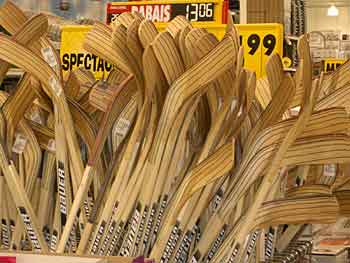 A bin of hockey sticks on sale A bin of hockey sticks on sale
There are dishes, and pots and pans, and storage containers, and some furniture, and lighting. I browsed the Christmas lights, now on sale, for some of the intense blue LED lights I've seen up here, but didn't manage to make a buying decision. In an impressive section of snow shovels: snow scoops, collapsible shovels, adjustable-length shovels, children's shovels - not surprisingly, more choice than I've ever seen - we found a clever folding model for the car, and I managed to ask for a windshield scraper ("un outil pour grater les fenetres d'auto?") - hey, don't laugh, he understood me!
At the check-out, J. said, "be sure to get the money." I don't quite understand about Canadian Tire money, except that it seems to work kind of like S&H green stamps (yes, how old are you, dear reader?) being redeemable for future purchases at Canadian tire. Canadians joke about it, saying it's worth more than their own currency - which, as the loonie (the vernacular for a Canadian dollar, called that because it has a loon on it) rises in value, is becoming a lot less true. But he needn't have worried. The cashier, Sonia, handed me my currency automatically, with my receipt. For my $20+ purchase, I received a 5-cent and a 25-cent Canadian Tire bill - which, mes copains, is not much. But I was delighted. I walked out to the parking lot turnign the bills over in my hands, staring at them like the clueless immigrant that I am, but feeling that warm glow of crossing yet one more threshold.
4:51 PM
|
Sunday, January 02, 2005
GLASS BEADS, BUT NOT THE GAME
We were downtown today for church, then had lunch and went to a movie ("House of Flying Daggers"). When we came out at 3:00 we were astonished to see white everywhere: it was the sort of storm that we call ice-pellets - very very fine, tiny crystals of ice that look like snow but are, in fact, hard and sharp, stinging your cheek and forming a treacherous surface that is like tiny glass beads. We walked cautiously to the car, and drove even more cautiously home, stopping at the Provigo at Parc and Sherbrooke to get some sole and a baguette and a few other things we needed.
We had planned to do some other shopping errands today, but to our surprise everything was closed up tight. We found out that Quebec has sort of "blue laws" still - the government says when shops can be open and when they have to close - and this is apparently still the New Year holiday. Businesses that insist on opening, like the Indigo bookstore, one of the only businesses open on St. Catherine Street today, have to pay a heavy fine. There was postal service only for a few days last week, and the banks and government offices will still be closed tomorrow. These closures are inconvenient when you don't expect them, and surely it can't be great for the economy, but on the other hand, coming as we do from such a commercialized culture, it's actually nice to have a period of time when everybody just slows down and takes time off.
So much of what goes on here reminds me of my childhood. No store were open on Sunday in my hometown; in fact I remember when a pharmacy decided to open for a few hours - it was a sort of scandal. There were still some blue laws in New Hampshire and Vermont when I moved there; that has very much changed with the emptying of downtowns and the growth of malls and franchises.
As J. and I discussed over our lunch today - watching Quebec families (French, Asian, Cree, Spanish) at nearby tables enjoying their own leisurely meals - it's a questions of what values are going to drive a culture, and who is responsible for making those decisions? In the United States, we worship money and the personal ability both to make and spend it. We always seem to be influenced in the direction of "more is better". I've always seen that to some extent, but never as clearly as I do now, living parttime in a culture where other things are considered more important, where basic needs are cared for - subject to some collective compromising - and quality of life is defined differently. I also notice how difficult it is for me to adapt to certain aspects of this, such as how much more slowly business is conducted, and how much less emphasis is placed on "accomplishment". It's getting to be a more and more interesting, and complex, life experiment.
Meanwhile, the snow just keeps coming down.
9:34 PM
|
Saturday, January 01, 2005
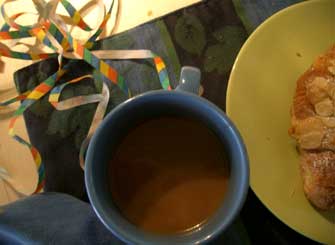
Happy New Year, everybody!
We got to bed at...um...4:30 am, and were back up around 10:00. I feel surprisingly good, considering. Last night we went to a party - our first party in this city, really - heavily weighted toward Montreal bloggers, where we met some great people (of course! they're bloggers!) and a most excellent yellow cat.
One of the people I met was a young Chinese woman who came here several years ago from Beijing, studied at McGill, and decided to stay. She's fluent in English and Chinese, of course, and becoming fluent in French. We talked for a long time about many things, especially about being only-daughters with close relationships with our parents and a great love for where we came from, who have traveled far from our childhoods and now put a lot of effort into understanding those gaps and bridge them, both for our own sakes and those we love. We found out we shared a lot, in spite of being from nearly opposite sides of the planet, including, I think, a certain gentleness and kindness of nature, curiosity, and a determination to choose happiness while keeping our eyes wide open to the darkness and light of the world. It was a good meeting to begin the new year, and created a kind of stillness of heart in the middle of a very fun party with great food, freely-flowing wine and loud, happy, bilingual conversation.
Toward the end of our conversation, we talked a little about Chinese calligraphy, and she told me a Chinese proverb about the importance of writing. "We say," she said, "the palest ink is stronger than the brightest memory."
Happy New Year. Happy writing.
1:06 PM
|
|
|